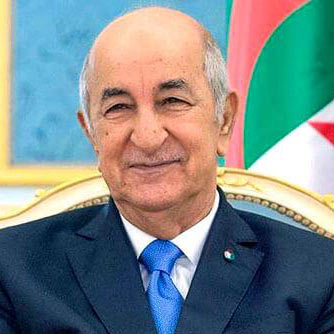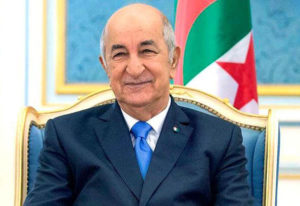



On 3 November 2020, during the pandemic in Algeria, it was reported that Tebboune tested positive for COVID-19 and was admitted to a hospital in Germany for treatment. On 29 December 2020, Tebboune returned to Algeria after finishing treatment.
Persistent rumours, which he regularly denies, suggest he was born in Morocco and became an Algerian citizen after the Algerian War of Independence. After working in Beirut to direct the Algerian Center for Information and Culture from 1970-1974, he returned to Algeria to work as a journalist at the state newspaper El Chaâb for three years, before being elected to represent the province of Tlemcen in 1977. Twelve years later, he was appointed Ambassador to Saudi Arabia, a position he held until 1993. As a member of the centrist Democratic National Rally (RND), he was President of the National Transitional Council from 1994 to 1997 and of the People’s National Assembly from 1997 to 2002. Since July 2002, he has served as President of the Council of the Nation, the upper house of parliament. He replaced Abdelaziz Bouteflika for some presidential duties, like welcoming foreign leaders to Algeria, during the last part of the former President’s tenure. He was a strong ally of the latter, supporting his fifth candidacy even during the 2019 Algerian protests. As provided for under article 102 of the Algerian Constitution, he became acting head of state of Algeria on 9 April 2019, seven days after the resignation of Abdelaziz Bouteflika. His term can last for a maximum of 90 days while the presidential election is held. By law, he cannot participate in this election.
Source: https://en.wikipedia.org/wiki/Abdelkader_Bensalah
1956: Bouteflika finishes his secondary education, and joins the ALN (Armée de libération nationale), which is part of FLN.
1957: Starts serving as officer, working specifically out of Oujda, not participating in fights.
1960: Is stationed in the southern regions of Algeria.
1961: Participates in a secret Algerian delegation to Aulnoy, France, in order to negotiate with the French authorities.
1962: With the birth of Muslim independent Algeria, Bouteflika is appointed Minister of Youth, Sport and Tourism.
1963: Bouteflika is appointed Foreign Minister, at the age of 26.
— Bouteflika also becomes member of the legislative assembly.
1964: He is elected for the congress of the FLN.
1979: After serving as foreign minister under two different presidents, Ahmed Ben Bella and Houari Boumedienne, Bouteflika finally has to resign from his post.
1981: Bouteflika goes into exile, after being charged with corruption. The case is later dropped.
1987 January: Bouteflika returns to Algeria.
1988 October: Bouteflika signs a protest against the ruthless acts by government troops against young protesters.
1989: He participates in the FLN congress, and is elected to the central committee.
1998 December: Declares that he will run for president with the next elections.
1999 April 15: Elected president with 73.8% of the votes, after all the other candidates withdrew in protest. French figures (Le Monde) gave Bouteflika only 28% in an election with 23% turn-out. The elections are met with international criticism and internal protest in the days following. Out of 47 candidates, 7 were permitted to run for election. 6 of them would withdraw so close to the election, that the ballots could not be changed. They all, therefore, received votes.
— August 1: Bouteflika declares that he will put an agreement between the government and FIS up for a referendum on September 16.
— December: Establishes a new government, with Ahmed Benbitour as prime minister. The government had members from the 7 political parties that had supported Bouteflika in the presidential election.
2001: Following the arrest and killing of a high school student in Kabylia, widespread riots break out in Kabylia. The protests, Black Spring, brings forth several large demonstrations in Algiers, the largest with 500,000 participants.
2004 April 8: Bouteflika is reelected in presidential elections, winning 83.5% of the votes. The election is called fair by international observers, but is boycotted by the Kabyles.
— Introduces a National Reconciliation Plan, offering amnesty to many combatants in the Algerian Civil War.
— Becomes president of the Arab League, a term that would last one year.
2005 November 26: Hospitalized for 3 weeks.
2006 May 25: Appoints Abdelaziz Belkhadem new prime minister. He also announced a change in the constitution to allow the president to remain in office indefinitely.
Rishi Sunak, Prime Minister of the United Kingdom (since Oct 25, 2022) Rishi Sunak (born…
Giorgia Meloni, Prime Minister of Italy (since Oct 22, 2022) Giorgia Meloni (born 15 January…
Mahamat Déby, President of Chad (since Oct 10, 2022) Mahamat Idriss Déby Itno (born 1…
João Lourenço, President of Angola (sworn in on Sept 26, 2017) Sworn in for his…
William Ruto, President of Kenya (elected on Aug 9, 2022 with 50.5% of the vote)…
Gustavo Petro, President of Colombia (since Aug 7, 2022) Gustavo Francisco Petro Urrego ODB ODSC…
This website uses cookies.
View Comments
As President, he presided over the end of the bloody Algerian Civil War in 2002, and he ended emergency rule in February 2011 amidst regional unrest. he is the prisident of algeria(the People's Democratic Republic of Algeria), not a dictator. correct yourselves
Thank you for your comment. We rely on the data from The Freedom House, and by double checking it there just now, Algeria is still considered a NOT FREE country - https://freedomhouse.org/report/freedom-world/2017/algeria
when someone tell you i live in a free country, and they reply "no i double check my data and you don't live in a free country", do you know how stupid you sounds??
Thanks so much for your feedback. I am pretty sure that next year the Freedom House report may change the status of Algeria from NOT FREE; however, for now, we need to leave the information as is since we cannot rely on an individual opinion. We do leave the comments section open though so that people like you can express the opinion and challenge the Freedom House reports.
Well done. Good job. Thank you.
it is an insult to the Algerian people and the 1.5 million Martyrs who gave their lives to free this contry from france colonization (which lasted 132 years).
the president is selected by people choice. Algerian president has been elected four times 1999 2004 2009 2014 and the upcoming vote is in 2019.
the people like the president M.Abdelaziz Bouteflika, and his deeds to our country he ended terrorism and civil war, he gave us free midical care (free). i'm a phd student i don't pay for education thanks to the Algerian state, he gave us free education in matter of fact the states pays me for studying. if we can we will vote for him in 2019. doesn't make him dictator it makes him loved.